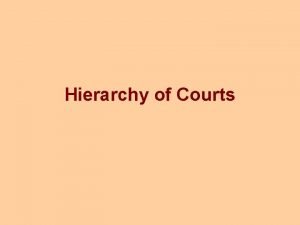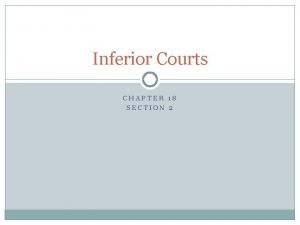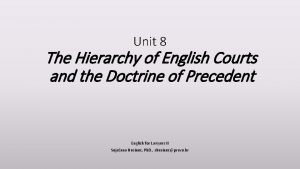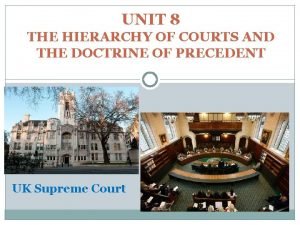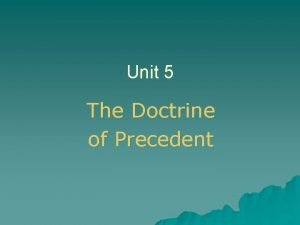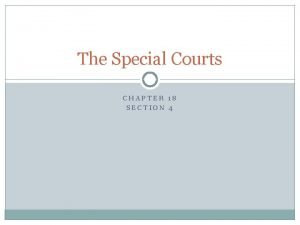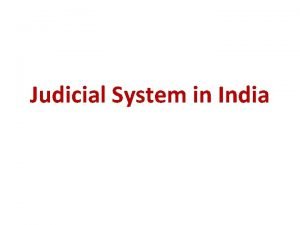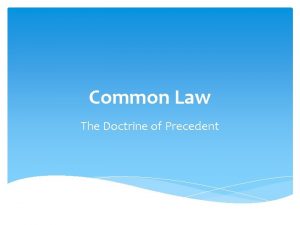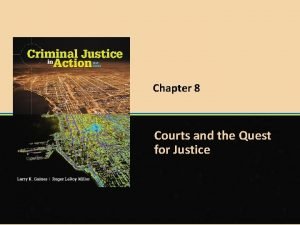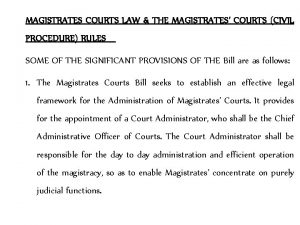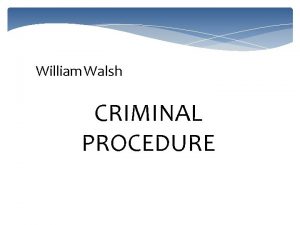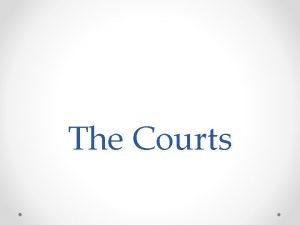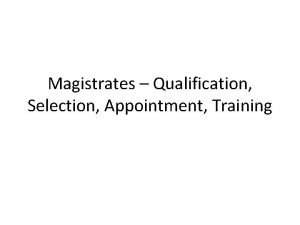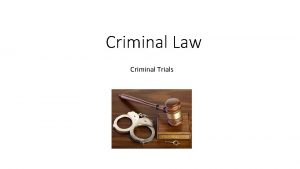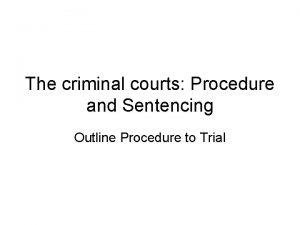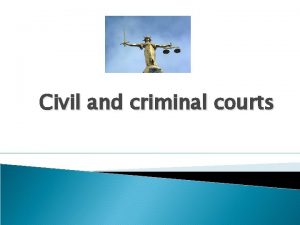CRIMINAL PROCEDURE AND PRACTICE IN THE MAGISTRATES COURTS











- Slides: 11

CRIMINAL PROCEDURE AND PRACTICE IN THE MAGISTRATES’ COURTS: PRELIMINARY ENQUIRIES Mag. A. Mohamed 17 Jan 2019

LEGISLATIVE FRAMEWORK Preliminary Enquiries are governed by the Indictable Offences (Preliminary Enquiry) Act Chap. 12: 01 Administration of Justice (Indictable Proceedings) Act 2011 & 2018 Amendment seek to abolish Preliminary Enquiries and introduce Initial and Sufficiency Hearings before a Master of the Criminal Division of the High Court. The 2011 Act is awaiting Proclamation. The 2018 Amendment is currently before Parliament. Until these pieces of legislation have been Proclaimed, the Indictable Offences (Preliminary Enquiry) Act is relevant and Preliminary Enquiries are alive! The Criminal Procedure Rules 2016 are applicable to Preliminary Enquires. The overriding objective of the Rules is that criminal cases be dealt with justly. (Rule 3. 1)

Rule 3. 3 CPR gives a list, though not complete as to what dealing with a case justly includes. In the past the biggest problem plaguing the Mag Courts in relation to Preliminary Enquiries (P. I) was the inordinate delay. • There is no justice for the Accused, witnesses, victims. • Public trust and confidence in the justice system is eroded. In order to complete P. I in a timely manner courts have been engaging in robust case management but its success is dependent on both the Prosecution and Defence complying with directions given by the court. Paper committals are being used in P. I which also reduces the time spent on P. I drastically. (16 c Indictable Offences Act)

PRELIMINARY ENQUIRIES: PROCEDURE & DUTY OF COUNSEL Ø 1 st Hearing: Duty of Counsel: 1. Application for Bail. If the matter has to be adjourned for the consideration of Bail where the tracing may not be available or the Magistrate needs further information that is not available on the 1 st day, ensure that the adjournment does not exceed two (2) days: CPR Rule 6. 1 2. Ensure that you are provided with the initial details of the Prosecution’s Case. CPR Rule 7. 2. Rule 7. 3 gives guidance as to what the initial details must include.

2 ND HEARING DUTY OF COUNSEL: 1. Inform the Court whether or not the directions have been complied with. 2. Once defence has in its possession the statements of the Prosecution witnesses, defence to indicate the time frame required to peruse statements and take instructions from Accused person. 3. Be realistic as well as reasonable with the times frame required to indicate witnesses for cross examination. Whatever time frame requested BE READY on the adjourned date. 4. In indicating witnesses for cross examination N. B : The P. I is the presentation of the Prosecution’s case. It is for the Court to determine whether on the prosecution’s evidence, a prima facie case is established. It is not a trial. THEREFORE, THERE IS NO NEED TO CROSS EXAMINE ALL THE WITNESSES FOR THE PROSECUTION. THERE IS ALSO NO NEED FOR LENGHTY CROSS EXAMINATION PREPARATION IS KEY!!!!

RD 3 HEARING DUTY OF COUNSEL 1. Indicate witnesses for cross examination and the approximate time required for cross examination of each witness requested. Sometimes you may find that you do not need any witnesses for cross. 2. If there is a change in the witness list, defence has the responsibility to contact the Prosecutor and inform the Pros of the witness required. This is to ensure that the witness is present on the date of the hearing and that the time scheduled for the hearing of the matter is maintained. Give the Pros sufficient notice to locate the witness. 3. Similarly if upon reflection, defence does not want witnesses previously indicated for cross, the Pros should be informed of this. 4. Hearing date is fixed

4 TH HEARING (P. I STARTS AND IS COMPLETED) DUTY OF COUNSEL: General 1. After robust case management, neither side should be requesting an adjournment. The Court should not and would not grant an adjournment except in exceptional circumstances where there is an unforeseen circumstance. Having another matter in another court is not an unforeseen circumstance. The purpose of case management is to ensure that matters are heard in a timely manner and that can only be done if the time schedules are honoured . Be respectful and courteous. It is disrespectful and discourteous when defence attorneys do not appear for a matter with absolutely no indication to the Court. It is unprofessional when a matter is set for a particular time, attorneys walk in court 2 or 3 hours later with no word to the Court requesting

4 TH HEARING (P. I STARTS AND IS COMPLETED) DUTY OF COUNSEL CON’T 1. Stick to the time frames indicated for cross examination of the witnesses. Magistrates will hold you to the time frames indicated during case management… preparation is key! 2. Be honest with your clients. Do not waste the courts time by making a no case submission where there is no valid basis for doing so. 3. Have defence witnesses present in the event the prosecution discharges their duty and the Accused wishes to call witness at the P. I

4 TH HEARING (P. I STARTS AND IS COMPLETED) DUTY OF COUNSEL CON’T 1. From the time the date of hearing is scheduled you should inform the Accused to start preparing the necessary documents for bail in the event that prosecution establishes a prima facie case and there is a committal. Evidence 1. Where the Prosecution is proceeding via paper committal ensure the statutory requirements under 16 C (3) of the Indictable Offences Act are complied with. Where the witness is under 18 years of age ensure that the requirements of 16 C (4) are complied with. Statutory Requirements under 16 C (3): a) Statement is signed by the witness who made it; b) Statement was sworn before a Justice of the Peace and authenticated by the JP by a certificate signed by him; c) Statement contains a declaration by the witness that the statement is true to the best of his knowledge and belief and he made the statement knowing that he would be liable to prosecution if he wilfully stated anything in it that he knew to be false or did not believe it to be true d) The statement was served on all parties to the proceedings by or on behalf of the party proposing to tender it; and e) There is no objection to the statement being tendered.

4 THHEARING (P. I STARTS AND IS COMPLETED) DUTY OF COUNSEL CON’T 1. Indicate any evidentiary objection. PREPARATION is therefore necessary. Defence can also indicate to the Pros before the date of hearing the evidential objections. There may be agreement on the admissibility of the evidence. If there is no consensus then both sides can be ready to make their submissions to the Court. This ensures that the matter is completed in the stipulated time. 2. Ensure that the witnesses requested for cross examination are present in court before the Prosecution proceeds to tender the statements under 16 C of the Indictable Offences Act. Sometimes, witnesses become unavailable between the swearing of the statements and the actual day of hearing. The evidence in chief of the witnesses is adduced by tendering of statements but the witness is not available for cross. Where the witnesses’ availability may have been altered between the swearing of the statement and the date of hearing, the prosecution may make an application under section 15 C of the Evidence Act. The statement may no longer be admissible under section 16 C of the Indictable Offences Act.

Committal for Sentence Section 27 A Indictable Offences (Preliminary Enquiry) Available in all Indicatable Matters except treason and murder Accused must be represented Accused wants to plead guilty. Committed to High Court for Sentence which fast tracks the matter in the High Court.
 Wimbledon magistrates court
Wimbledon magistrates court Hierarchy of criminal courts in india
Hierarchy of criminal courts in india Circuit court maps
Circuit court maps Uk courts hierarchy
Uk courts hierarchy Hierarchy of uk courts
Hierarchy of uk courts Doctrine of precedent
Doctrine of precedent Chapter 18 section 4 the special courts
Chapter 18 section 4 the special courts Wolverhampton tennis
Wolverhampton tennis 3 types of courts in india
3 types of courts in india Difference between ratio decidendi and obiter dicta
Difference between ratio decidendi and obiter dicta 4 levels of state courts
4 levels of state courts Arizona irs
Arizona irs

